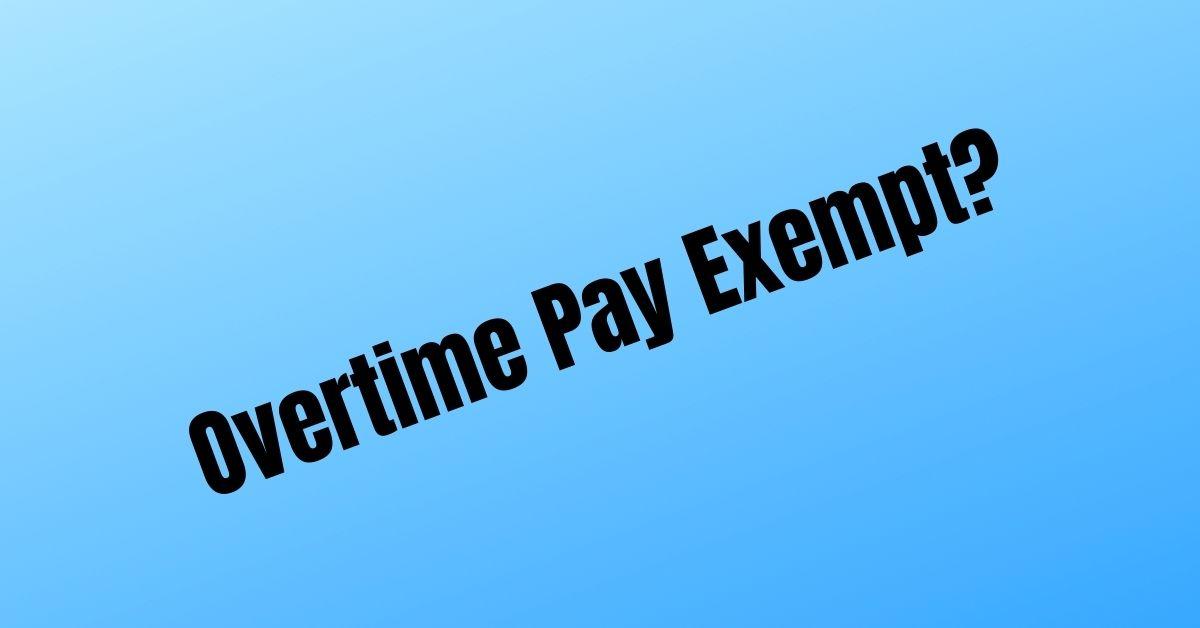There is a lot of confusion about whether or not managers get paid overtime. The answer is it depends! In this blog post, we will explore the topic of overtime pay for managers and provide some clarity on the subject. Keep reading to learn more!
What is Overtime for a Manager, and how is it Calculated?
Do managers get paid overtime? It’s a common question, and the answer is not always straightforward. First, it’s essential to understand the Fair Labor Standards Act (FLSA). The FLSA is a federal law that establishes minimum wage and overtime pay standards. According to the FLSA, you must pay employees time and a half for any hours worked over 40 in a week. However, there are some exceptions to this rule. One of those exceptions is for salaried employees who are “exempt.” Exempt employees are not entitled to overtime pay because they meet specific criteria. For example, an exempt employee may be someone paid a salary of at least $455 per week, has a certain level of job responsibility, and does not perform manual labor. So, if a manager meets the criteria for an exempt employee, they are not entitled to overtime pay. However, if a manager does not meet an exempt employee’s requirements, they may be entitled to overtime pay. It would help if you spoke with an attorney or HR representative to make this determination. They will be able to help.
Are Managers Entitled to Overtime Pay?
The answer to this question is a bit more complicated. Generally speaking, managers are not entitled to overtime pay. However, there are some exceptions to this rule. For example, if a manager’s primary duty is managing, they are not entitled to overtime pay. However, if a manager’s primary duty is something else (such as customer service or sales), they may be entitled to overtime pay. It all depends on the specifics of the job.
How do Employers Determine who is Exempt From Overtime pay Requirements?
Employers must use the “duties test” to determine who is exempt from overtime pay requirements. The duties test looks at the job’s primary duties to see if they meet specific criteria. If the job’s primary responsibilities do not meet the requirements, then the employee is not exempt and may be entitled to overtime pay.
What are Some of the Arguments for and Against Paying Managers Overtime Wages?
There are a few different arguments for and against paying managers overtime wages. Some people argue that managers should not receive overtime because they already receive a salary. Others say that managers should receive overtime pay because they often work long hours and deserve to be compensated for their time. Ultimately, it is up to the employer to decide whether or not to pay managers overtime wages.
Can Employers Require Management Employees to Work Overtime Without Compensation?
Do managers get paid overtime? The short answer is that it depends. Federal law does not require that employers pay their management employees overtime, but some state laws do. In addition, many employers have policies in place that mandate overtime pay for management employees. So, if you’re a manager and you’re wondering whether you’re entitled to overtime pay, the best thing to do is check with your employer. If your employer does not have a policy in place, you may want to check your state’s laws to see if they mandate overtime pay for management employees. Even if your state doesn’t require overtime pay, it’s still worth asking your employer about their policies. After all, you never know – they may be willing to negotiate!
How has the Recent Rise in Lawsuits Over Unpaid Overtime Affected Managerial Practices in the United States?
Do managers get paid overtime? It’s a question that’s often asked lately, as the number of lawsuits over unpaid overtime has been on the rise in the United States. The answer, unfortunately, is not always clear. Federal law exempts some managerial employees from the overtime pay requirements, but the definition of “manager” can be pretty vague. As a result, many managers are finding themselves caught in the middle of a legal debate over whether or not they are entitled to overtime pay. The confusion has led to a significant increase in overtime lawsuits as employees seek to recover their wages. In response, many businesses have taken steps to clarify their policies on manager overtime pay and to ensure that employees are correctly classified. While the situation is still unfolding, it’s clear that the recent rise in overtime lawsuits has had a significant impact on managerial practices in the United States.
Conclusion
Although the Fair Labor Standards Act (FLSA) does not require overtime pay for managers, many employers choose to provide it to attract and retain quality employees. However, with the recent rise in lawsuits over unpaid overtime, some employers are reconsidering their policies and may start limiting or even stopping paying overtime wages to managerial staff. This could hurt both managers and businesses alike. What do you think? Should managers be paid overtime?
If you like this article, you might like Do Supervisors Get Paid Bonuses.

